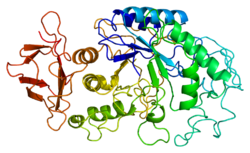
Summary
Pancreatic alpha-amylase is an enzyme that in humans is encoded by the AMY2A gene.[5][6]
| AMY2A | |||||||||||||||||||||||||||||||||||||||||||||||||||
|---|---|---|---|---|---|---|---|---|---|---|---|---|---|---|---|---|---|---|---|---|---|---|---|---|---|---|---|---|---|---|---|---|---|---|---|---|---|---|---|---|---|---|---|---|---|---|---|---|---|---|---|
 | |||||||||||||||||||||||||||||||||||||||||||||||||||
| |||||||||||||||||||||||||||||||||||||||||||||||||||
| Identifiers | |||||||||||||||||||||||||||||||||||||||||||||||||||
| Aliases | AMY2A, AMY2, AMY2B, PA, amylase, alpha 2A (pancreatic), amylase alpha 2A (pancreatic), amylase alpha 2A | ||||||||||||||||||||||||||||||||||||||||||||||||||
| External IDs | OMIM: 104650 MGI: 88019 HomoloGene: 20179 GeneCards: AMY2A | ||||||||||||||||||||||||||||||||||||||||||||||||||
| |||||||||||||||||||||||||||||||||||||||||||||||||||
| |||||||||||||||||||||||||||||||||||||||||||||||||||
| |||||||||||||||||||||||||||||||||||||||||||||||||||
| |||||||||||||||||||||||||||||||||||||||||||||||||||
| |||||||||||||||||||||||||||||||||||||||||||||||||||
| Wikidata | |||||||||||||||||||||||||||||||||||||||||||||||||||
| |||||||||||||||||||||||||||||||||||||||||||||||||||
Amylases are secreted proteins that hydrolyze 1,4-alpha-glucoside bonds in oligosaccharides and polysaccharides, and thus catalyze the first step in digestion of dietary starch and glycogen. The human genome has a cluster of several amylase genes that are expressed at high levels in either salivary gland or pancreas. This gene encodes an amylase isoenzyme produced by the pancreas.[6]
References edit
- ^ a b c GRCh38: Ensembl release 89: ENSG00000243480 – Ensembl, May 2017
- ^ a b c GRCm38: Ensembl release 89: ENSMUSG00000074264 – Ensembl, May 2017
- ^ "Human PubMed Reference:". National Center for Biotechnology Information, U.S. National Library of Medicine.
- ^ "Mouse PubMed Reference:". National Center for Biotechnology Information, U.S. National Library of Medicine.
- ^ Groot PC, Bleeker MJ, Pronk JC, Arwert F, Mager WH, Planta RJ, Eriksson AW, Frants RR (Jul 1988). "Human pancreatic amylase is encoded by two different genes". Nucleic Acids Res. 16 (10): 4724. doi:10.1093/nar/16.10.4724. PMC 336663. PMID 3260028.
- ^ a b "Entrez Gene: AMY2A amylase, alpha 2A; pancreatic".
External links edit
- Human AMY2A genome location and AMY2A gene details page in the UCSC Genome Browser.
See also edit
Further reading edit
- Kaczmarek MJ, Rosenmund H (1977). "The action of human pancreatic and salivary isoamylases on starch and glycogen". Clin. Chim. Acta. 79 (1): 69–73. doi:10.1016/0009-8981(77)90462-4. PMID 890964.
- Jacob M, Lainé J, LeBel D (1993). "Specific interactions of pancreatic amylase at acidic pH. Amylase and the major protein of the zymogen granule membrane (GP-2) bind to immobilized or polymerized amylase". Biochem. Cell Biol. 70 (10–11): 1105–14. doi:10.1139/o92-156. PMID 1284286.
- Groot PC, Mager WH, Henriquez NV, et al. (1991). "Evolution of the human alpha-amylase multigene family through unequal, homologous, and inter- and intrachromosomal crossovers". Genomics. 8 (1): 97–105. doi:10.1016/0888-7543(90)90230-R. PMID 2081604.
- Nishide T, Nakamura Y, Emi M, et al. (1986). "Primary structure of human salivary alpha-amylase gene". Gene. 41 (2–3): 299–304. doi:10.1016/0378-1119(86)90110-1. PMID 2423416.
- Horii A, Emi M, Tomita N, et al. (1988). "Primary structure of human pancreatic alpha-amylase gene: its comparison with human salivary alpha-amylase gene" (PDF). Gene. 60 (1): 57–64. doi:10.1016/0378-1119(87)90213-7. hdl:11094/36665. PMID 2450054. S2CID 85098215.
- Gumucio DL, Wiebauer K, Caldwell RM, et al. (1988). "Concerted evolution of human amylase genes". Mol. Cell. Biol. 8 (3): 1197–205. doi:10.1128/mcb.8.3.1197. PMC 363264. PMID 2452973.
- Samuelson LC, Wiebauer K, Gumucio DL, Meisler MH (1988). "Expression of the human amylase genes: recent origin of a salivary amylase promoter from an actin pseudogene". Nucleic Acids Res. 16 (17): 8261–76. doi:10.1093/nar/16.17.8261. PMC 338557. PMID 2458567.
- Groot PC, Bleeker MJ, Pronk JC, et al. (1989). "The human alpha-amylase multigene family consists of haplotypes with variable numbers of genes". Genomics. 5 (1): 29–42. doi:10.1016/0888-7543(89)90083-9. PMID 2788608.
- Wise RJ, Karn RC, Larsen SH, et al. (1986). "A complementary DNA sequence that predicts a human pancreatic amylase primary structure consistent with the electrophoretic mobility of the common isozyme, Amy2 A". Mol. Biol. Med. 2 (5): 307–22. PMID 6336237.
- Tricoli JV, Shows TB (1984). "Regional assignment of human amylase (AMY) to p22----p21 of chromosome 1". Somat. Cell Mol. Genet. 10 (2): 205–10. doi:10.1007/BF01534909. PMID 6608795. S2CID 21230969.
- Nishide T, Emi M, Nakamura Y, Matsubara K (1984). "Corrected sequences of cDNAs for human salivary and pancreatic alpha-amylases [corrected]". Gene. 28 (2): 263–70. doi:10.1016/0378-1119(84)90265-8. PMID 6610603.
- Maruyama K, Sugano S (1994). "Oligo-capping: a simple method to replace the cap structure of eukaryotic mRNAs with oligoribonucleotides". Gene. 138 (1–2): 171–4. doi:10.1016/0378-1119(94)90802-8. PMID 8125298.
- Qian M, Haser R, Buisson G, et al. (1994). "The active center of a mammalian alpha-amylase. Structure of the complex of a pancreatic alpha-amylase with a carbohydrate inhibitor refined to 2.2-A resolution". Biochemistry. 33 (20): 6284–94. doi:10.1021/bi00186a031. PMID 8193143.
- Brayer GD, Luo Y, Withers SG (1996). "The structure of human pancreatic alpha-amylase at 1.8 A resolution and comparisons with related enzymes". Protein Sci. 4 (9): 1730–42. doi:10.1002/pro.5560040908. PMC 2143216. PMID 8528071.
- Suzuki Y, Yoshitomo-Nakagawa K, Maruyama K, et al. (1997). "Construction and characterization of a full length-enriched and a 5'-end-enriched cDNA library". Gene. 200 (1–2): 149–56. doi:10.1016/S0378-1119(97)00411-3. PMID 9373149.
- Rydberg EH, Sidhu G, Vo HC, et al. (1999). "Cloning, mutagenesis, and structural analysis of human pancreatic alpha-amylase expressed in Pichia pastoris". Protein Sci. 8 (3): 635–43. doi:10.1110/ps.8.3.635. PMC 2144294. PMID 10091666.
- Brayer GD, Sidhu G, Maurus R, et al. (2000). "Subsite mapping of the human pancreatic alpha-amylase active site through structural, kinetic, and mutagenesis techniques". Biochemistry. 39 (16): 4778–91. doi:10.1021/bi9921182. PMID 10769135.
- Aughsteen AA (2001). "A comparative immunohistochemical study on amylase localization in the rat and human exocrine pancreas". Saudi Medical Journal. 22 (5): 410–5. PMID 11376382.
- Numao S, Maurus R, Sidhu G, et al. (2002). "Probing the role of the chloride ion in the mechanism of human pancreatic alpha-amylase". Biochemistry. 41 (1): 215–25. doi:10.1021/bi0115636. PMID 11772019.






